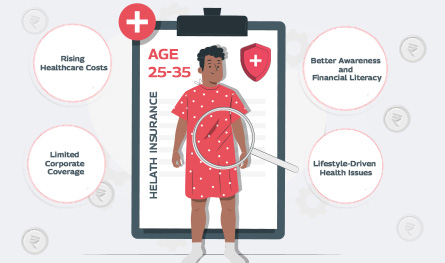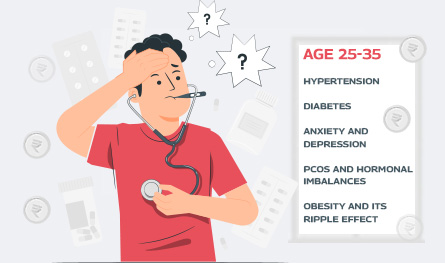Related Articles
 Jan 08, 2025
Jan 08, 2025
Is Varicose Vein surgery covered under the health insurance policy in India
 Health Insurance
Health Insurance
.png)
It now sounds cliched to say how health insurance is important to your financial security during medical emergencies. It is time to get more specific about the policies that suit your needs. Need assessment helps you to pinpoint the benefits you require and also foresee your requirements shortly. Two very prominent types of health insurance are critical illness and maternity insurance.
They both cover very different needs, so it is essential to know which one to prioritise when. One should be prioritised over the other based on certain key aspects like age, coverage requirement, stage of life, benefits and renewal facilities.
.png)
When it comes to health insurance planning in India, two major concerns stand out: critical illness coverage and maternity insurance. While both serve different purposes, knowing which one to prioritise depends on your financial situation, life stage, and risk factors.
Let’s break down the key differences, their importance, and how to make the right decision.
Critical illness insurance provides a lump sum payout if you are diagnosed with a serious, life-threatening disease such as cancer, heart attack, kidney failure, or stroke.
Features of Critical Illness Insurance:
Every insurer has different inclusions and exclusions.
Given the rising treatment costs, ₹10-20 lakh coverage is ideal for metro cities.
Critical illness can be a standalone plan or an add-on rider with life insurance. A standalone plan offers broader coverage.
Some insurers require a 30-day survival period after diagnosis before paying the claim.
Maternity insurance covers pregnancy-related expenses, including delivery costs, pre-postnatal care, and newborn expenses. It is usually offered as an add-on cover with health insurance as there are no standalone maternity insurance plans available in India.
Features of Maternity Insurance:
Since most plans have a 2-4 year waiting period, purchase coverage well in advance.
Some policies include vaccinations and NICU charges, while others do not.
Ensure adequate coverage for both delivery types.
Like any other policy, choosing maternity insurance or a critical illness policy requires an assessment of your financial status, health condition, lifestyle and the number of dependents in your family. It is, after all, an investment in your health for planned or unplanned events.
The significant difference between these two conditions is the preparedness that you may have to deal with them. Usually, pregnancy is planned due to the extra lifelong expenses associated with it. Critical illness is primarily sudden and can upset your financial planning considerably.
As you can see, the objectives of both these insurances vary greatly, and one takes precedence over the other, depending on your life situation.
Prioritize Critical Illness Insurance as it provides a lump sum to manage medical and daily expenses.
Maternity Insurance is essential, but only if bought early due to waiting periods.
Critical illness insurance protects against life-altering diseases, while maternity insurance covers short-term expenses.
Both policies serve different needs, but if you can only afford one, critical illness insurance should take priority due to its long-term financial protection. However, securing maternity insurance early is the smart choice if you’re in the family planning stage.

Paybima Team
Paybima is an Indian insurance aggregator on a mission to make insurance simple for people. Paybima is the Digital arm of the already established and trusted Mahindra Insurance Brokers Ltd., a reputed name in the insurance broking industry with 17 years of experience. Paybima promises you the easy-to-access online platform to buy insurance policies, and also extend their unrelented assistance with all your policy related queries and services.
.png)
When you're planning to take a personal loan, knowing your monthly EMI in advance can help you stay financially prepared. The Muthoot Personal Loan EMI Calculator is a simple and efficient tool that provides instant EMI estimates based on your loan amount, interest rate, and tenure.


Relocating your two-wheeler to a different state needs to follow many procedures. Depending on the duration for which you are moving to the new place, it becomes necessary to transfer your vehicle papers if it is for more than a year. Although tedious, the process of relocating vehicles can become easy if you follow certain tips mentioned in this post. Read on!


In what’s being called a quiet healthcare revolution, India’s young working professionals are reportedly making the most health insurance claims – outpacing even senior citizens. Surprised? So are the insurance providers. Young adults ranging between 25 and 35 years, who are often assumed to be in peak health, are now dominating the charts in health insurance claims by age.


If you think lifestyle-related health issues only show up after 40, think again. Youth no longer guarantees immunity. Today’s 25 - 35 age group is increasingly facing medical issues that only plague older adults. The reason? Long working hours at the desk, deliveries on speed dial, and a social life that rarely includes a decent amount of sleep are some of the reasons for the early onset of medical conditions like diabetes, anxiety, and hypertension.
